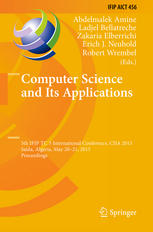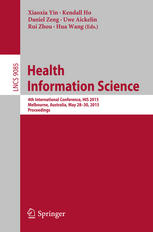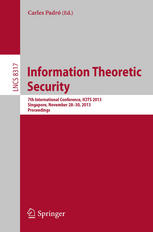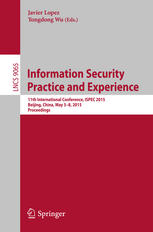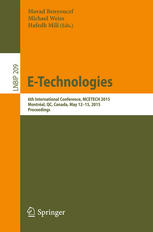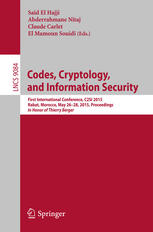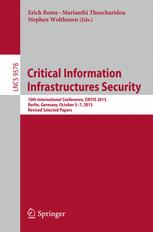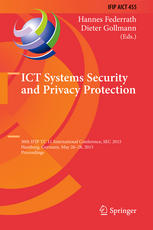Information Theoretic Security 8th International Conference 1st Edition by Anja Lehmann, Stefan Wolf ISBN 331917469X 9783319174693
$50.00 Original price was: $50.00.$25.00Current price is: $25.00.
Information Theoretic Security 8th International Conference 1st Edition by Anja Lehmann, Stefan Wolf – Ebook PDF Instant Download/Delivery: 331917469X, 978-3319174693
Full download Information Theoretic Security 8th International Conference 1st Edition after payment
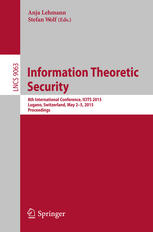
Product details:
ISBN 10: 331917469X
ISBN 13: 978-3319174693
Author: Anja Lehmann, Stefan Wolf
This book constitutes the thoroughly refereed proceedings of the 8th International Conference on Information Theoretic Security, ICITS 2015, held in Lugano, Switzerland, in May 2015.
The 17 full papers presented in this volume were carefully reviewed and selected from 57 submissions. The papers cover a variety of topics at the intersection of cryptography, information theory, and quantum physics.
Information Theoretic Security 8th International Conference 1st Table of contents:
1. Generalizing Efficient Multiparty Computation
1.1 Introduction
1.2 Efficiency
2. Preliminaries
3. Generic Construction of Verifiable OT from Structure-Preserving OT
4. Generalized Oblivious Transfer
5. Batch Single-Choice Cut-and-Choose OT
6. Modified Cut-and-Choose from [Lin13]
7. Multi-Sender k-Out-of-n OT
References
2. Round-Optimal Perfectly Secret Message Transmission with Linear Communication Complexity
- Introduction
- Our Contributions
2.1 Complete Characterization of Networks
2.2 Linear Communication Complexity
2.3 Efficient Discriminant Algorithms - Network Model and Definitions
- Communication Efficiency
- Round Optimality
5.1 Round Efficient Protocol
5.2
5.3 Polynomial Time Algorithm for Identifying the Optimal
5.4 An Example of Round Optimal Protocol - Linear Communication Complexity
6.1 Round Optimal Protocol with Linear Communication - Conclusions and Open Problems
References
3. On Zero-Knowledge with Strict Polynomial-Time Simulation and Extraction from Differing-Input Obfuscation
- Introduction
- A Eight-Round Statistically Zero-Knowledge Argument of Knowledge
2.1 The Primitives in Use - Differing-Input Obfuscation of Next-Message Functions
- The Six-Round Zero-Knowledge Argument of Knowledge
4.1 Construction Idea
4.2 The Protocol
References
4. Unifying Leakage Classes: Simulatable Leakage and Pseudoentropy
- Introduction
- Preliminaries
2.1 Pseudoentropy
2.2 Leakage Models - Simulatable Leakage
3.1 Extending Simulatable Leakage to General Applications - Strongly Simulatable Leakage
References
5. On the Orthogonal Vector Problem and the Feasibility of Unconditionally Secure Leakage-Resilient Computation
- Introduction
- Techniques and Ideas
- Leakage-Resilient Two-Party Computation from Orthogonal Vectors
- Leakage Resilient Computation from an Imperfect Source of Orthogonal Vectors
- A Quantum Solution for the Orthogonal Vector Problem
References
6. Metric Pseudoentropy: Characterizations, Transformations, and Applications
- Introduction
1.1 Computational Entropy
1.2 Our Contribution
1.3 Organization of the Paper - Preliminaries
- Transformations
- Characterizing Metric Pseudoentropy
4.1 Connections to Separating Hyperplanes - Applications
5.1 A Short Proof of the Efficient Dense Model Theorem
5.2 The Optimal Efficient Dense Model Theorem
5.3 Equivalence of HILL Entropy and Unpredictability Entropy - Conclusion
References
7. Nonuniform Indistinguishability and Unpredictability Hardcore Lemmas: New Proofs and Applications
- Introduction
1.1 Hardcore Lemmas and Their Applications
1.2 Outline of the Paper - Preliminaries
- Hardcore Lemmas
3.1 Hardcore Lemma for Unpredictability
3.2 Hardcore Lemma for Indistinguishability – Reduction to Unpredictability Case - Indistinguishability Hardcore Lemma for Pseudoentropy
- Applications: Extracting from Metric Pseudoentropy of Poor Quality
- Conclusion
References
8. Gambling, Computational Information, and Encryption Security
- Introduction
- Preliminaries
- Proportional Betting with Noisy Inside Information
- Computational Setting
- A Characterization Based on Pseudoentropy
- Risk-Neutral Adversaries
- Conclusions and Future Work
References
9. Query-Complexity Amplification for Random Oracles
- Introduction
1.1 Motivation of This Work
1.2 Contributions of This Paper - Preliminaries
2.1 Basic Notation
2.2 Random Systems
2.3 Two-Interface Systems and Converters - Parameterized Constructions and QCA
- The Caveats of Plain Iterated Hashing
- Complexity Amplification via Collision-Free Iteration
5.1 The Protocol and the Simulator
5.2 Indistinguishability Proof
References
10. The Chaining Lemma and Its Application
- Introduction
- Preliminaries
2.1 Notation
2.2 Information Theory Basics - The Chaining Lemma
- Application to Tamper-Resilient Cryptography
References
11. Weakening the Isolation Assumption of Tamper-Proof Hardware Tokens
- Introduction
- Preliminaries
2.1 Notation
2.2 Model - The Case of Incoming Communication
3.1 Unconditionally Secure OTM with Two Tokens
3.2 Impossibility of Unconditionally Secure OTM from a Single Token
3.3 Unconditionally Secure OT with a Single Token
3.4 Computationally Secure OTM from a Single Token - The Case of Outgoing Communication
4.1 Impossibility of Information-Theoretically Secure OT(M)
4.2 Unconditionally Secure Commitment with a Single Token
4.3 Computationally Secure OTM with a Single Token - Conclusion
References
12. Limited View Adversary Codes: Bounds, Constructions, and Applications
- Introduction
1.1 Motivations for This Work and Previous Results
1.2 Our Results
1.3 Related Work
1.4 Organization - Preliminaries
2.1 List Decodable Codes
2.2 Adversarial Wiretap Code (AWTP Code)
2.3 Message Authentication Code (MAC) - Model and Definitions
3.1 Limited View Adversarial Channels
3.2 Limited View Adversary Code - An Upper Bound on the Rate of LV Codes
- An LV Code Family that Achieves the Bound
- Reliable Message Transmission and LV Codes
6.1 Reliable Message Transmission (RMT)
6.2 Comparing RMT Constructions - Conclusions
References
13. Locally Decodable Codes for Edit Distance
- Introduction
1.1 Our Technique in More Detail - Searching Sorted Lists with Corruptions
2.1 Our Approach - Transforming Standard LDC into LDC for Edit Distance
References
14. The Multivariate Hidden Number Problem
- Introduction
- Preliminaries
2.1 Fourier Analysis on Finite Groups
2.2 Finite Field Representations
2.3 Hidden Number Problem - Multivariate Hidden Number Problem
- Main Results
- Applications
5.1 Solving the Hidden Number Problem
5.2 Hardness of Every Single Bit of CDH by Changing
References
15. Lattice Point Enumeration on Block Reduced Bases
- Introduction
- Preliminaries
- Worst-Case Analysis of Enumeration After Block Reduction
3.1 A Naive Attempt - Performance in Practice
4.1 Experiments
4.2 Simulation
References
16. Adaptive Key Recovery Attacks on NTRU-Based Somewhat Homomorphic Encryption Schemes
- Introduction
1.1 Notation
1.2 Paper Organization - Fundamentals and Security Model
- Previous Constructions
- NTRU-Based Somewhat Homomorphic Encryption
- Adaptive Key Recovery Attacks
5.1 Attacking the BLLN Scheme for
5.2 Attacking the BLLN Scheme for General
5.3 Attacking the LTV Scheme - Concluding Remarks
People also search for Information Theoretic Security 8th International Conference 1st :
international conference on information theoretic security
universal hashing for information theoretic security
perfect secrecy and information theoretic security
information-theoretic security and cryptography
5 principles of information security
Tags:
Anja Lehmann,Stefan Wolf,Information,Theoretic,Security 8th,International,Conference 1st
You may also like…
Computers - Computer Science
Computers - Computer Science
Business & Economics
Business & Economics - Management & Leadership
Science (General) - International Conferences and Symposiums
Business & Economics
Business & Economics - Management & Leadership




